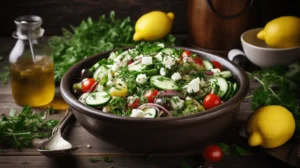What is Mediterranean Cucumber Salad?
At its heart, Mediterranean cucumber salad is a simple yet vibrant dish that highlights the best of the Mediterranean diet. The star ingredient is fresh, crunchy cucumber, paired with tomatoes, red onion, and often a sprinkle of olives and feta cheese. These flavors come together with a drizzle of olive oil and a dash of herbs like parsley or dill, creating a salad that’s both light and satisfying.
This salad isn’t just a side dish—it’s a celebration of Mediterranean flavors and healthy eating. Its versatility makes it perfect for summer picnics, family dinners, or as a quick meal on busy weekdays.
Why is it Popular?
The popularity of Mediterranean cucumber salad stems from its perfect blend of taste, nutrition, and ease of preparation. First off, it’s incredibly fresh. Each bite is bursting with crisp textures and bold flavors. Secondly, it’s healthy. Loaded with vitamins, antioxidants, and heart-healthy fats, this salad fits seamlessly into a wide range of diets, including gluten-free and vegan lifestyles (with a few tweaks).
Lastly, it’s quick to prepare. You don’t need to be a master chef or spend hours in the kitchen to whip up this crowd-pleaser. In just a few minutes, you can create a dish that feels gourmet but is as approachable as it is delicious.
Table of Contents
Essential Ingredients of a Mediterranean Cucumber Salad
Fresh Produce: Cucumber, Tomato, and Red Onion
The foundation of any great Mediterranean cucumber salad lies in its fresh ingredients. Cucumbers provide a cool, crisp texture, while ripe tomatoes add a juicy sweetness that balances the dish. Red onions, with their sharp, slightly spicy flavor, give the salad a zesty kick. Together, these vegetables create a vibrant mix that’s both visually appealing and delicious.
These ingredients are not only tasty but also packed with nutrients. Cucumbers are rich in hydration and low in calories, making them perfect for a healthy diet. Tomatoes bring vitamins A and C to the table, while red onions add antioxidants that can help combat inflammation.
Olives, Feta, and Herbs: Mediterranean Flavors
No Mediterranean cucumber salad would feel finished without common tastes like olives, feta cheese, and fresh herbs. In addition, olives bring a salty tang that improves the freshness of the vegetables, while creamy feta adds richness. Furthermore, fresh herbs like parsley, dill, or mint tie everything together, adding layers of flavor and smell.
However, to customize the salad, you can try out different types of olives or swap feta for a plant-based option to suit food needs. Thus, these parts make the salad truly Mediterranean, combining bold tastes with healthy benefits.
Step-by-Step Recipe Guide

Ingredients List and Preparation Steps
Creating a Mediterranean cucumber salad is incredibly easy. Start with these ingredients:
- 2 cups of diced cucumbers
- 1 cup of cherry tomatoes, halved
- ½ cup of thinly sliced red onion
- ¼ cup of pitted olives, sliced
- ⅓ cup of crumbled feta cheese
- 2 tablespoons of olive oil
- 1 tablespoon of freshly squeezed lemon juice
- 1 teaspoon of dried oregano or fresh herbs like parsley
To prepare:
- Combine cucumbers, tomatoes, and red onions in a large bowl.
- Add olives and feta cheese for extra flavor and texture.
- Drizzle olive oil and lemon juice over the mixture. Toss gently to coat.
- Sprinkle with herbs and a pinch of salt and pepper to taste. Serve immediately or refrigerate until ready to enjoy.
Customizing Your Salad
The beauty of this salad lies in its flexibility. For instance, if you want a lighter option, you can skip the cheese and add more veggies. On the other hand, if you prefer more protein, try adding grilled chicken or chickpeas. Additionally, you can swap lemon juice for balsamic vinegar to change up the dressing. As a result, the possibilities are endless, making sure your Mediterranean cucumber salad works for any taste or occasion.
Health Benefits of Mediterranean Cucumber Salad
Rich in Vitamins and Antioxidants
One of the best things about Mediterranean cucumber salad is how healthy it is. Every ingredient has its own benefits. Cucumbers, for example, keep you hydrated and provide vitamin K, which helps with strong bones and healthy blood flow. Tomatoes are packed with vitamins A and C, which help boost your immune system, keep your skin glowing, and improve your overall health. Red onions add antioxidants that reduce swelling and protect your body from harmful effects caused by free radicals.
The olive oil in this salad is also a star ingredient. It provides healthy fats, called monounsaturated fats, which lower bad cholesterol and support a healthy heart. Olives, another key ingredient, add vitamin E, which helps keep your cells strong and may even slow down signs of aging. When you combine all these fresh, nutrient-packed ingredients, you get a salad that’s not only delicious but also great for your body.
In addition, fresh herbs like parsley or dill bring more benefits. They add vitamins, minerals, and antioxidants, while also enhancing the salad’s flavor. This mix of veggies, healthy fats, and herbs creates a dish that’s good for you in many ways.
Perfect for Weight Management and Heart Health
With its low-calorie ingredients, Mediterranean cucumber salad is a smart choice for anyone trying to manage their weight. Cucumbers and tomatoes are mostly water, which helps fill you up without adding extra calories. This makes the salad a satisfying yet light option that’s perfect as a main course or a side dish.
The olive oil and olives in the salad provide healthy fats that support heart health. These fats, combined with the fiber from fresh vegetables, help keep your digestion smooth and your blood sugar levels steady. Fiber also makes you feel full for longer, which can help prevent overeating or snacking on less healthy foods.
This salad works well in many types of diets, from low-calorie plans to heart-friendly eating habits. It’s a quick, easy-to-make dish that’s both tasty and good for your health. Whether you want to eat lighter meals, improve your heart health, or simply enjoy a fresh, flavorful dish, Mediterranean cucumber salad fits the bill perfectly.
Serving Suggestions and Pairings

Best Occasions to Serve Mediterranean Cucumber Salad
Mediterranean cucumber salad is a flexible dish that works well in many situations. It’s a great addition to summer barbecues, where its cool, fresh flavors go perfectly with grilled meats and seafood. It’s also a good side dish for family dinners or holiday meals, bringing a light and fresh touch to heavier foods.
For a quick lunch, pair it with warm pita bread or some roasted chickpeas. It’s also a great option for meal prepping—just keep the dressing separate until you’re ready to eat so it doesn’t get soggy.
What to Pair it With?
This salad pairs well with an array of Mediterranean-inspired dishes. Try serving it alongside grilled chicken, lamb kebabs, or a hearty lentil soup for a balanced meal. For lighter fare, pair it with a simple hummus dip or tzatziki and some fresh pita. The flavors also blend beautifully with seafood dishes, like grilled shrimp or baked salmon.
For more delicious recipes to complement your Mediterranean cucumber salad, check out our article on 10 Delicious Gluten-Free Lunch Ideas for a Healthy Lifestyle.
Common Questions About Mediterranean Cucumber Salad
What is the Difference Between a Greek and Mediterranean Salad?
Greek salads and Mediterranean cucumber salad share similar ingredients, but there are subtle differences. Greek salads typically include cucumbers, tomatoes, red onions, olives, and feta, dressed with olive oil and oregano. They often have a chunkier texture and may include bell peppers.
In contrast, a Mediterranean cucumber salad focuses more on cucumbers as the primary ingredient and often incorporates fresh herbs like parsley or dill. While both dishes are rooted in Mediterranean cuisine, the cucumber salad offers a lighter, more refreshing twist.
Are Cucumbers Good on a Mediterranean Diet?
Yes! Cucumbers are an important part of many dishes in the Mediterranean diet, including Mediterranean cucumber salad. They are low in calories, full of water, and give your body key nutrients like vitamin K and potassium. Their high water content helps keep you hydrated, and their crunchy texture makes meals feel fresh. Whether in salads, soups, or as a snack, cucumbers are a key part of this heart-healthy way of eating.
What is a Mediterranean Salad Made Of?
A typical Mediterranean salad, like Mediterranean cucumber salad, includes a mix of fresh vegetables such as cucumbers, tomatoes, and red onions. It’s usually enhanced with olives, feta cheese, and fresh herbs for added flavor. A simple dressing made of olive oil, lemon juice, and herbs ties everything together, creating a dish that’s both flavorful and nutritious.
How Do You Make Valerie Bertinelli’s Tomato Cucumber Salad?
Valerie Bertinelli’s version of tomato cucumber salad closely resembles a classic Mediterranean cucumber salad. Her recipe combines fresh cucumbers and tomatoes with red onions and a tangy vinaigrette made from olive oil, red wine vinegar, and dried oregano. For added depth, she suggests sprinkling in fresh herbs like parsley or basil, making her recipe a simple and flavorful option for any occasion.
Is it OK to eat Greek salad every day?
Yes, eating Greek salad daily is generally okay as it’s packed with fresh vegetables, healthy fats from olive oil, and protein from feta cheese. However, balance is key. While the ingredients are nutritious, be mindful of portion sizes, especially when it comes to feta cheese and olives, as they can be high in sodium and calories. Pairing Greek salad with other nutrient-rich foods ensures a well-rounded diet.
What is a substitute for olives in a Greek salad?
If you’re not a fan of olives or need a substitute, try capers for a similar salty and tangy flavor. Other great options include roasted red peppers, sun-dried tomatoes, or even pickled artichoke hearts. These alternatives maintain the Mediterranean vibe while adding a unique twist to your salad.
What is not eaten in a Mediterranean diet?
The Mediterranean diet avoids processed and heavily refined foods. Items like sugary drinks, packaged snacks, refined grains, and processed meats (like hot dogs and deli meats) are not typically part of this eating style. Instead, the focus is on whole, natural ingredients like fresh produce, whole grains, lean proteins, and healthy fats.
What is the fastest way to lose weight on the Mediterranean diet?
To lose weight quickly on the Mediterranean diet, focus on portion control and balance. Prioritize vegetables, lean proteins (like fish or chicken), and healthy fats (like olive oil or nuts), while reducing portions of calorie-dense items like bread, pasta, and cheese. Incorporate regular physical activity, drink plenty of water, and avoid sugary or processed foods. This combination helps maximize the diet’s benefits for weight loss while maintaining overall health.
Conclusion
Mediterranean cucumber salad is more than just food—it’s a mix of fresh ingredients, bold flavors, and healthy eating. With crisp cucumbers, juicy tomatoes, and tangy feta cheese, this salad brings the lively taste of Mediterranean cooking to your table. It’s not only simple to make but also full of nutrients, from heart-healthy fats to hydrating veggies, that boost your overall health.
Whether you serve it as a side dish, a light lunch, or a fresh addition to a summer barbecue, this flexible salad works for any occasion. You can make it your own by adding your favorite toppings or pairings while enjoying a healthy and tasty meal.
The next time you want a dish that’s both easy and delicious, try making a Mediterranean cucumber salad. It’s a tasty reminder that healthy eating doesn’t have to be hard—it can be as easy as mixing a few fresh ingredients together.

